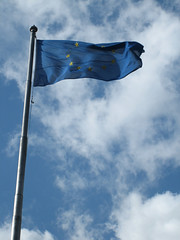Scotland and the EU
There seems to be no definitive answer in sight to the question whether an independent Scotland will have to apply to join the EU as a new country or simply remain an EU member as one of the UK’s two successor states.
The issue is that there is no precedent, as pointed out on the Shifting Grounds blog:
Robin Cook asked the Foreign Office’s legal advisers for their opinion on the status of an independent Scotland in the EU back in 1999 when I worked as his Special Adviser. Three conclusions stood out in the advice that came back.
First, there is no existing procedure for handling a breakaway from an EU member state. The Council of Ministers would therefore need to improvise one according to its own design. […]
Lawyers are notoriously unhappy to give advice in cases where there is no precedent, which is why we’re mostly hearing from politicians at the moment.
On the apply from scratch side of the argument, we have a long list of Spanish unionist politicians, such as the European Parliament’s vice-president:
Alejo Vidal-Quadras, the European Parliament’s vice-president, became the first leading Spanish politician to suggest publicly that a fear of separatist movements in Catalonia and the Basque country would influence his country’s approach to Scotland.
He said an independent Scotland should have to apply for membership and go through the accession process like any other state. He insisted that his views reflected the Spanish government’s position.
Mr Vidal-Quadras said: “If the result of the referendum is that Scottish people want to be an independent state, they should go through the accession process [for the EU].”
Asked if this position was taken because of separatist movements in Spain, he said: “You are exactly right.”
Taking more or less the same line, Spain’s foreign minister joined the fray:
[Jose Manuel] Garcia-Margallo told Spain’s senate that after independence, Scotland would face a potentially tortuous negotiating process and would also need his country’s support.
He said: “In the hypothetical case of independence, Scotland would have to join the queue and ask to be admitted, needing the unanimous approval of all member states to obtain the status of a candidate country — and to sign the final treaty [of accession].”
He suggested EU members nations would need to check carefully Scotland’s legislation before approving the 35 separate chapters that have to be negotiated before admission would be granted. EC president Jose Manuel Barroso recently made similar claims.
Looking at the other side of the argument, we have already quoted what the European Commission’s vice-president Viviane Reding said:
Diario de Sevilla: The Vienna Convention says this: the state resulting from a parent state leaves all international organisations in which the parent is represented.
Viviane Reding: Come on, international law does not say anything like that. Please solve your internal political problems within Spain. I trust the European mentality of the Catalans.
Another promininent member of the European Commission agreed:
Joaquín Almunia – a fierce opponent of Catalan independence – said it would “not be honest” to say a breakaway region would be stuck outside the EU if it was independent.
Mr Almunia also insisted citizens of the EU could not be stripped of their rights just because their territory separated from a member state.
[…]
He told a newspaper: “You cannot give a categorical answer that somebody who splits off would remain outside and we wouldn’t know anything about them for centuries. It’s not like that. If you are a European citizen you have certain rights.”
So where does this leave us?
There is no doubt in my mind that unless Catalonia has already left Spain and become a full EU member by early 2015, Spain will happily do its utmost to make things difficult for Scotland just to make the Catalans back down. In EU terms that means that if the decision to allow Scotland to continue its membership has to be taken by unanimity, Spain will veto it.
So the question is whether unanimity will be needed, and an EU lawyer denied this would be the case back in January:
However this was dismissed by lawyers for the EU who said an independent Scotland could be treated as one of two successor states, and that a separate seat for Edinburgh would require only a simple majority vote. No single EU member would have a veto.
A lawyer for the EU told the news agency that a deal could be “done by the [European] Council, using qualified majority voting and with the required say-so of the European Parliament.”
To conclude, the EU’s commissioners and lawyers seem to be saying that you cannot throw EU citizens out of the EU, and that continuing membership would be decided by qualified majority voting (which means Spain wouldn’t be able to block it).
I presume the specific legal advice that the Scottish Government are now seeking will be specifically concerned with the use of qualified majority voting in the European Council. I’ll be looking forward to reading the papers they publish subsequently.

Pingback: More about Scotland and the EU | Arc of Prosperity